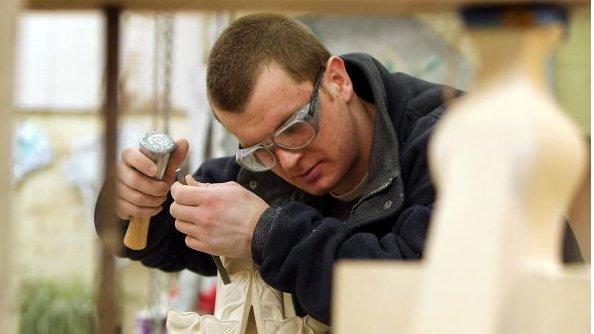Apprenticeships 'should last a year', report says
- Published

Apprenticeships in construction, manufacturing and engineering are popular
Apprenticeships in England should last for at least a year and genuinely train someone in a new role, a key report for the government says.
The Richard Review says the definition of apprenticeship has been "stretched too far" and needs to be rethought.
It warns that too often the traditional relationship between the employer and the person being trained has been lost.
The government welcomed the report and said it would respond in due course.
There has been a rapid increase in the number of apprenticeships in England in recent years, with successive governments urging young people to consider them instead of university.
But there are concerns about quality, with some as short as three months.
Entrepreneur Doug Richard was asked by Business Secretary Vince Cable and Education Secretary Michael Gove to consider the future of apprenticeships in England.
'Paperwork gymnastics'
In his review, Mr Richard says "apprenticeships or the notion of them are popular", but that this has led to many things being called apprenticeships which, in fact, are not.
"Simply enough, not all instances of training on a job are apprenticeships," he says.
They "require a new job role, a role that is new to the individual and requires them to learn a substantial amount before they can do that job effectively," he said.
As a consequence, he says, the nation risks losing sight of the core features of what makes apprenticeships work.
And he suggests they should last for at least a year, adding that those "measured in weeks or months", can still "fall short".
He adds that while the knowledge required for a job could be covered in a shorter period of time, it took time for "the individual to transform from an apprentice to a skilled worker".
This comes after numerous complaints that some agencies and businesses have been offering low grade apprenticeships that only last for a few weeks or even months, in exchange for cheap labour and government funding.
He is clear that training to improve the skills of someone who has been in their job for some time or someone who is not yet ready to start work should not be called an apprenticeship.
He warns that that the relationship between the employer and the trainee is being lost, as schemes have become government-led training initiatives, shaped by training professionals, rather than employers.
He calls for a new set of qualifications which set out what a person should be able to do and know at the end of their training.
But they must also offer a set of skills broad enough for other jobs.
'Driving seat'
He said these new qualifications should be redefined by employers who should set the standard, rather than ministers.
They should be free of the "bureaucratic box ticking assessment" and "micro-level" prescription that he says is a feature of current vocational qualifications.
"It is complicated and off-putting to an employer to have to undertake paperwork gymnastics to pigeonhole their system into a redefined set of curricular approaches," he adds.
He calls for the apprentice's accomplishments to be robustly tested and validated, and says they must include high quality attainments in maths and English for those who have not got GCSEs in the subjects before they start.
And he argues that apprenticeships must be "well regarded" if they are not to be viewed as a lower status alternative to university.
Business Secretary Vince Cable said the review echoed the government's current thinking on putting employers in the driving seat of training programmes.
"His recommendations will help us to build on the current successes.. and tailor a programme which is sustainable, high-quality and meets the changing needs of our economy in the decades to come."
Education Secretary Michael Gove said it is vital that the qualifications and assessment involved in every apprenticeship are rigorous, trusted, and give employers confidence in the ability of their apprentices.
The shadow business secretary, Chuka Umunna called for a Tech Bacc to support the value of vocational education: "High quality apprenticeships can give young people a crucial ladder to a successful career... but apprenticeships have to mean quality and Labour has repeatedly warned ministers that it can't mean re-labelling short courses or in-work training as apprenticeships to boost numbers."
Association of Teachers and Lecturers general secretary Dr Mary Bousted said she agreed with the report's assertion that "apprenticeships should deliver a valued, high-kudos route for young people, which is as equally respected as the academic route".
"It is concerning however that the phrase 'light touch' is mentioned several times throughout the report. Any mention of 'light touch', particularly in regard to the approval of training organisations that provide good-quality training relevant for the sector, should be treated with caution."
- Published11 June 2012

- Published6 November 2012

- Published15 November 2011